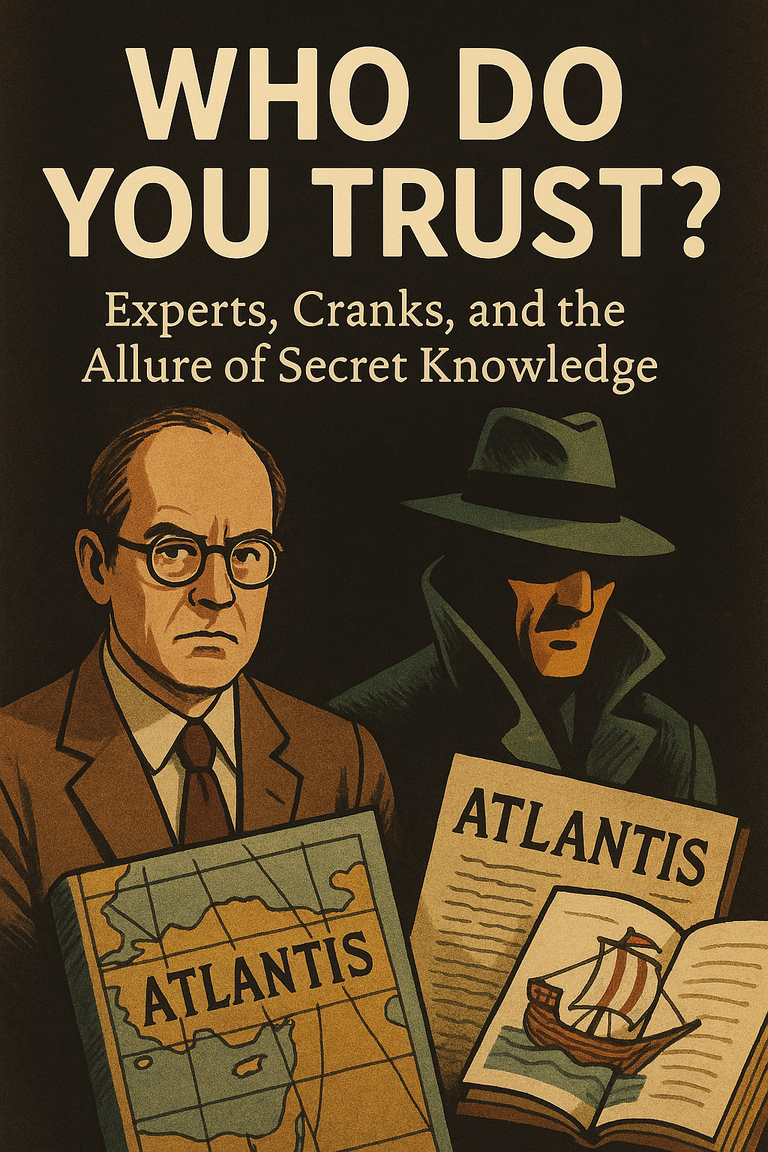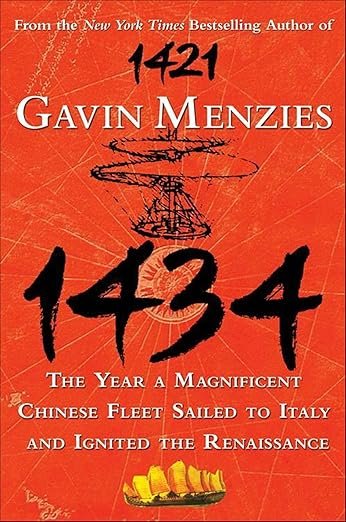
The other day I was at a used book store called Book Off. I only mention the name because I’m sure some of you will find that amusing. It’s probably the largest used book store in Japan. I don’t know why the name, but I suppose the off is meant to mean discount; things like this happen in Japanese English, so you get used to it.
At any rate, at my local Book Off there is a tiny section for used English books. By nature of the store, the books you find in this section are completely random, which always makes it an interesting experience to browse.
So I was there and browsing this section, and what did I find? A curious book titled simply 1434 by a fellow named Gavin Menzies. The part that attracted my eye was the long subtitle: The year a magnificent Chinese fleet sailed to Italy and ignited the Renaissance.
Quite the bold claim there.
The book was on sale for only ¥100, which is the common Book Off price, despite all the inflation everywhere else. As of today, that is $0.70. Not a bad price for a book, especially a hardback book that seemed to be in pretty good condition.
I bought it and took it home and started reading. It starts with a bang. “Columbus knew America was there,” it says, “because he had maps of it.” “Magellan,” it claims, “knew about the strait that now bears his name due to his discovery of it, because he had seen a map showing it.” It went on, but you get the idea. Bold claims that discoveries of the Western world were not really discoveries but were in fact based on preëxisting knowledge.
It goes on to claim all this knowledge came from the Chinese, from their exploration of the world and their freely giving this knowledge to the West. It shows all kinds of supposed “evidence” for this.

Anyway, I read a few chapters in. I was both interested, but increasingly suspicious. Or rather, I became increasingly doubtful. If what this book claims is true, why has it never come out until now? It would rewrite history as we know it. Conspiracy? That would be the popular claim today, when everyone sees conspiracy everywhere. What would be the purpose of hiding this truth about the Chinese discovering everything? Historians have been happily exposing what scumbags many of our Western heroes actually were for many years now — why would they suddenly start protecting them? Because China is the greater evil? I suppose that’s what the conspiracy-minded folks would say. As much of an asshole as Columbus was, he’s our asshole, by God, and so better to give him credit for discovering the New World than the Chinese. Something like that.
These doubts in my head, I went to Wikipedia to see if the author, Gavin Menzies, had a page. Oh did he ever. Turns out historians all over the world have dismissed this book (and the prequel 1421: The Year China Discovered America) as pseudohistory. Even extremist Chinese historians who might otherwise love to embrace an alternative history where China instead of the West discovered everything attack the book as complete nonsense.
You know your history book is full of shit when even the people you’re promoting say it’s full of shit.
Not only that, historians attack almost every claim he makes, saying he either twists evidence to suit his narrative or just makes things up. Wikipedia cites a piece of evidence that he refers to at two different places in the book with two completely opposite interpretations. His timeline doesn’t even make sense, historians claim. All in all, his books have been rated among the least accurate history books of all time. Wow. Even on Menzies’ side, things don’t look good. It seems like the book was rewritten by several people as they sought to mold the narrative. That’s a bad look.
The criticism goes on. Go read it for yourself.
So, my suspicions were confirmed. I did follow some of the Wikipedia source links to make sure they actually pointed to historians and not just random blog posts, and they did. Yeah — historians really don’t think much of Mr Menzies or his ideas and methods. Oh well. The book only cost me ¥100. 70 cents. Not much of a loss.
Menzies seemed to later embrace (and confirm) the pseudohistory label, and he went on to write a book claiming he knew the whereabouts of Atlantis. I could be wrong about this, but I don’t think writing a book claiming you know the truth of Atlantis — complete with maps, no less — is the best way to get on the good side of the academic world. That’s usually a shortcut to the History Channel at 2 a.m., not to peer-reviewed journals.

This isn’t all that uncommon of a thing. Maybe you remember several years ago when Guns, Germs, and Steel by Jared Diamond was all the rage. It gave a very simple view of all of history, basically explaining how Europe rose from a backwater place to take over the world. But then historians, economists, and anthropologists came out and tore the book apart, saying that at best Diamond overemphasized some things and underemphasized others to better prove his ideas and, at worst, he simply made up his own facts when needed to prove a point.
Diamond’s book at least emerged with some credibility intact. It’s simplified pop history, sure — but still worth reading if you’re interested in that sort of thing. Compare that to Menzies’ books, which seem to be rated at the top of most worst history books of all time lists. Despite this, they both point to a similar message: that we need to be careful who we trust, especially when they make claims in areas they have no expertise in. This isn’t to say we can’t learn from nonexperts — just that we need to be more careful in trusting them.
Yuval Noah Harari’s popular book Sapiens: A Brief History of Humankind fits in this mold too. And we could find dozens more.
Lately it has become fashionable to mock experts as elitists and dismiss everything they say as lies or indoctrination, but I think this is a bad trend. Experts are experts for a reason. They have studied for years and years, they have read more on their subject or acted more on their subject than almost anyone else, they know incredible amounts of info about even the smallest detail of their area of expertise. Not only that, but academic books are incredibly strict. Claims must be sourced. What is allowed to be sourced is also very strict. In many cases, it must be a primary source, not a secondary — and certainly never a tertiary one. You may disagree with conclusions an expert makes, but you can’t deny the factual evidence they build their conclusions on.
Armchair amateur authors writing books and making bold claims might appeal to the conspiratorial idea of secret knowledge that the elites are covering up (for some reason), but their arguments often fall apart when we look at what they’re actually basing those arguments on. Either their evidence is nonsense, or they don’t even show their evidence and we’re just told to accept it. Faith may work in religion, but it’s a hell of a thing in any other discipline.
Anyway, my long-winded point is this: don’t throw out expert opinion just because it’s inconvenient or uncool. Otherwise, next thing you know, you’re nodding along to a guy who says the Chinese discovered America, founded the Vatican, and relocated Atlantis somewhere off the coast of Spain.